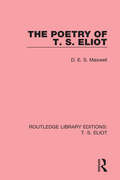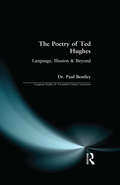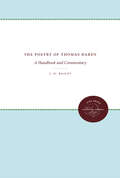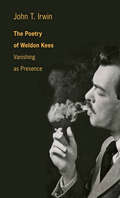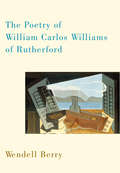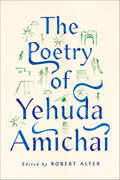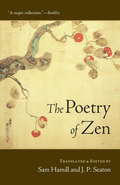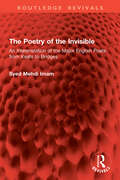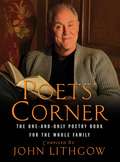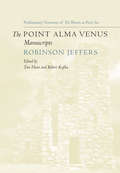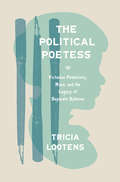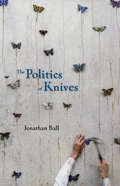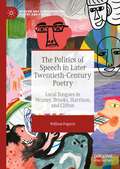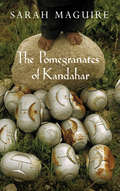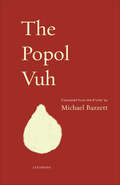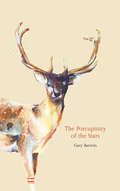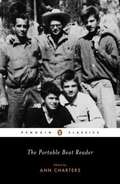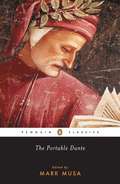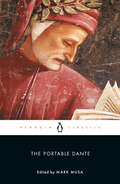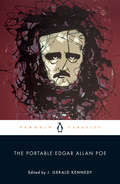- Table View
- List View
The Poetry of Susan Howe: History, Theology, Authority (Modern and Contemporary Poetry and Poetics)
by Will MontgomeryThe Poetry of Susan Howe provides a comprehensive survey of the major works of one of America's foremost contemporary poets. The book describes the relationship between poetic form and the various configurations of history, religious thought, and authority in Howe's writing. Will Montgomery argues that her highly opaque texts reflect the resistance that the past offers to contemporary investigation. Addressing lyric, literary history, collage and visual poetics, The Poetry of Susan Howe is a lucid and persuasive investigation of the volatile movements of this extraordinary body of work.
The Poetry of T. S. Eliot (Routledge Library Editions: T. S. Eliot #6)
by D. E. MaxwellIn this fascinating and revealing book, first published in 1952, Maxwell shows the development of Eliot’s poetry and poetic thought in the light of his political and religious attachments. This study traces Eliot’s style from the earliest poems to the Quartets, and examines the characteristics of Eliot’s earlier work adumbrate that of his maturity. The Poetry of T. S. Eliot is essential reading for students of literature.
The Poetry of Ted Hughes: Language, Illusion & Beyond (Longman Studies In Twentieth Century Literature)
by Paul BentleyThis text provides a lucid and accessible introduction to the poetry of Ted Hughes, a major figure in twentieth- century poetry whose work is concerned with the forces of nature and their interaction with the human mind. It is also the first full length study to place Hughes's poetry in the context of significant developments in literary theory that have occured during his life, drawing in particular on the 'French theorists'- Jacques Lacan, Julia Kristeva, and Roland Barthes. The study sheds new light on Hughes's prosody, and on such matters as Hughes's relation to the 'Movement' poets, the influence of Sylvia Plath, his relation to Romanticism, his interest in myth and shamanism, and the implications of the Laureateship for his work. The poems are presented in chronological order, tracing the development of Hughes's highly distinctive style. The study also discusses Hughes's recently published non-fiction- Winter Pollen (1994) and Shakespeare and the Goddess of Complete Being (1992). The Poetry of Ted Hughes is indispensable for all students and academics interested in contemporary poetry and culture.
The Poetry of Thomas Hardy: A Handbook and Commentary
by J. O. BaileyThis handbook provides the background necessary for fully understanding the nearly one thousand poems of Hardy. As it treats the poems individually and often supplements the analysis of a poem by relating it to other poems and to passages in the fiction, every comment helps build a portrait of Hardy as a poet.Originally published in 1970.A UNC Press Enduring Edition -- UNC Press Enduring Editions use the latest in digital technology to make available again books from our distinguished backlist that were previously out of print. These editions are published unaltered from the original, and are presented in affordable paperback formats, bringing readers both historical and cultural value.
The Poetry of Victorian Scientists
by Daniel BrownA surprising number of Victorian scientists wrote poetry. Many came to science as children through such games as the spinning-top, soap-bubbles and mathematical puzzles, and this playfulness carried through to both their professional work and writing of lyrical and satirical verse. This is the first study of an oddly neglected body of work that offers a unique record of the nature and cultures of Victorian science. Such figures as the physicist James Clerk Maxwell toy with ideas of nonsense, as through their poetry they strive to delineate the boundaries of the new professional science and discover the nature of scientific creativity. Also considering Edward Lear, Daniel Brown finds the Victorian renaissances in research science and nonsense literature to be curiously interrelated. Whereas science and literature studies have mostly focused upon canonical literary figures, this original and important book conversely explores the uses literature was put to by eminent Victorian scientists.
The Poetry of Vision: Five Eighteenth-Century Poets
by Patricia Meyer SpacksThis study examines some of the poetry of James Thomson, William Collins, Thomas Gray, Christopher Smart and William Cowper -- five eighteenth-century poets of sensibility.
The Poetry of Weldon Kees: Vanishing as Presence
by John T. IrwinA study in how a poet’s corpus is remembered after he vanishes.Weldon Kees is one of those fascinating people of whom you’ve likely never heard. Most intriguingly, he disappeared without a trace on July 18, 1955. Police found his 1954 Plymouth Savoy abandoned on the north side of the Golden Gate Bridge one day later. The keys were still in the ignition. Though Kees had alluded days prior to picking up and moving to Mexico, none of his poetry, art, or criticism has since surfaced either north or south of the Rio Grande. Kees’s vanishing has led critics to compare him to another American modernist poet who met a similar end two decades prior—Hart Crane. In comparison to Crane, Kees is certainly now a more obscure figure. John T. Irwin, however, is not content to allow Kees to fall out of the twentieth-century literary canon. In The Poetry of Weldon Kees, Irwin ties together elements of biography and literary criticism, spurring renewed interest in Kees as both an individual and as a poet. Irwin acts the part of literary detective, following clues left behind by the poet to make sense of Kees’s fascination with death, disappearance, and the lasting interpretation of an artist’s work. Arguing that Kees’s apparent suicide was a carefully plotted final aesthetic act, Irwin uses the poet’s disappearance as a lens through which to detect and interpret the structures, motifs, and images throughout his poems—as the author intended. The first rigorous literary engagement with Weldon Kees’s poetry, this book is an astonishing reassessment of one of the twentieth century’s most gifted writers.
The Poetry of William Carlos Williams of Rutherford
by Wendell BerryAcclaimed essayist and poet Wendell Berry was born and has always lived in a "provincial" part of the country without an established literary culture. In an effort to adapt his poetry to his place of Henry County, Kentucky, Berry discovered an enduringly useful example in the work of William Carlos Williams. In Williams' commitment to his place of Rutherford, New Jersey, Berry found an inspiration that inevitably influenced the direction of his own writing.Both men would go on to establish themselves as respected American poets, and here Berry sets forth his understanding of that evolution for Williams, who in the course of his local membership and service, became a poet indispensable to us all.
The Poetry of Yehuda Amichai (The Copenhagen Trilogy)
by Yehuda AmichaiThe largest English-language collection to date from Israel’s finest poetFew poets have demonstrated as persuasively as Yehuda Amichai why poetry matters. One of the major poets of the twentieth century, Amichai created remarkably accessible poems, vivid in their evocation of the Israeli landscape and historical predicament, yet universally resonant. His are some of the most moving love poems written in any language in the past two generations—some exuberant, some powerfully erotic, many suffused with sadness over separation that casts its shadow on love. In a country torn by armed conflict, these poems poignantly assert the preciousness of private experience, cherished under the repeated threats of violence and death. Amichai’s poetry has attracted a variety of gifted English translators on both sides of the Atlantic from the 1960s to the present. Assembled by the award-winning Hebrew scholar and translator Robert Alter, The Poetry of Yehuda Amichai is by far the largest selection of the master poet’s work to appear in English, gathering the best of the existing translations as well as offering English versions of many previously untranslated poems. With this collection, Amichai’s vital poetic voice is now available to English readers as it never has been before.
The Poetry of Zen
by J. P. Seaton Sam HamillA Zen poem is nothing other than an expression of the enlightened mind, a handful of simple words that disappear beneath the moment of insight to which it bears witness. Poetry has been an essential aid to Zen Buddhist practice from the dawn of Zen--and Zen has also had a profound influence on the secular poetry of the countries in which it has flourished. Here, two of America's most renowned poets and translators provide an overview of Zen poetry from China and Japan in all its rich variety, from the earliest days to the twentieth century. Included are works by Lao Tzu, Han Shan, Li Po, Dogen Kigen, Saigyo, Basho, Chiao Jan, Yuan Mei, Ryokan, and many others. Hamill and Seaton provide illuminating introductions to the Chinese and Japanese sections that set the poets and their work in historical and philosophical context. Short biographies of the poets are also included.
The Poetry of the First World War
by Santanu DasThe poetry of the First World War remains a singularly popular and powerful body of work. This Companion brings together leading scholars in the field to re-examine First World War poetry in English at the start of the centennial commemoration of the war. It offers historical and critical contexts, fresh readings of the important soldier-poets, and investigations of the war poetry of women and civilians, Georgians and Anglo-American modernists and of poetry from England, Ireland, Scotland, Wales and the former British colonies. The volume explores the range and diversity of this body of work, its rich afterlife and the expanding horizons and reconfiguration of the term 'First World War Poetry'. Complete with a detailed chronology and guide to further reading, the Companion concludes with a conversation with three poets - Michael Longley, Andrew Motion and Jon Stallworthy - about why and how the war and its poetry continue to resonate with us.
The Poetry of the Invisible: An Interpretation of the Major English Poets from Keats to Bridges (Routledge Revivals)
by Syed Mehdi ImamThe Poetry of the Invisible (1937) presents the English poets from the author’s own Eastern standpoint. It is an adventure into the invisible world of inner sight or sound as he finds it portrayed in Shelley, Keats, Browning, Bridges and other poets from whom he seeks to illustrate those aspects of the psychic theory which have become real to him.
The Poets' Corner: The One-and-Only Poetry Book for the Whole Family
by John LithgowFrom listening to his grandmother recite epic poems from memory to curling up in bed while his father read funny verses, award-winning actor John Lithgow grew up with poetry. Ever since, John has been an enthusiastic seeker of poetic experience, whether reading, reciting, or listening to great poems. The wide variety of carefully selected poems in this book provides the perfect introduction to appeal to readers new to poetry, and for poetry lovers to experience beloved verses in a fresh, vivid way. William Blake, Emily Dickinson, Edgar Allan Poe, and Dylan Thomas are just a few names among Lithgow's comprehensive list of poetry masters. His essential criterion is that "each poem's light shines more brightly when read aloud."
The Point Alma Venus Manuscripts
by Robinson JeffersThe years 1921 to 1927 were the most productive of Robinson Jeffers's career. During this period, he wrote not only many of his most well-known lyric poems but also Tamar, The Tower Beyond Tragedy, Roan Stallion, and The Women at Point Sur—the long poems that first established his reputation as a major American poet. Including an introduction, chronology, and critical afterword, the Point Alma Venus manuscripts presented here gather Jeffers's four unfinished but substantial preliminary attempts at what became The Women at Point Sur, which Jeffers believed was the "most inclusive, and poetically the most intense" of his narrative poems. The Point Alma Venus fragments and versions shed important light on the composition and themes of The Women at Point Sur. Further, they likely predate other key work from this crucial period, making them a necessary context for those who wish to clarify Jeffers's poetic development and to reinterpret his practice of narrative poetry. Ultimately, they call on general and scholarly readers alike to reconsider Jeffers's place in the canon of modern American poetry.
The Political Poetess: Victorian Femininity, Race, and the Legacy of Separate Spheres
by Tricia LootensThe Political Poetess challenges familiar accounts of the figure of the nineteenth-century Poetess, offering new readings of Poetess performance and criticism. In performing the Poetry of Woman, the mythic Poetess has long staked her claims as a creature of “separate spheres”—one exempt from emerging readings of nineteenth-century women’s political poetics. Turning such assumptions on their heads, Tricia Lootens models a nineteenth-century domestic or private sphere whose imaginary, apolitical heart is also the heart of nation and empire, and, as revisionist histories increasingly attest, is traumatized and haunted by histories of slavery. Setting aside late Victorian attempts to forget the unfulfilled, sentimental promises of early antislavery victories, The Political Poetess restores Poetess performances like Julia Ward Howe’s “Battle Hymn of the Republic” and Emma Lazarus’s “The New Colossus” to view—and with them, the vitality of the Black Poetess within African-American public life. Crossing boundaries of nation, period, and discipline to “connect the dots” of Poetess performance, Lootens demonstrates how new histories and ways of reading position poetic texts by Felicia Dorothea Hemans, Elizabeth Barrett Browning, Dinah Mulock Craik, George Eliot, and Frances E. W. Harper as convergence points for larger engagements ranging from Germaine de Staël to G.W.F. Hegel, Virginia Woolf, Elizabeth Bishop, Alice Walker, and beyond.
The Politics of Knives
by Jonathan BallIf David Lynch crashed into Franz Kafka in a dark alley, the result might look like The Politics of Knives. Moving from shattered surrealism to disembowelled films, these poems land us in a limbo between the intellectual and the visceral, between speaking and screaming. Finding the language of violence and the violence in language, Jonathan Ball becomes the Stephen King of verse.
The Politics of Speech in Later Twentieth-Century Poetry: Local Tongues in Heaney, Brooks, Harrison, and Clifton (Modern and Contemporary Poetry and Poetics)
by William FogartyThe Politics of Speech in Later Twentieth-Century Poetry: Local Tongues in Heaney, Brooks, Harrison, and Clifton argues that local speech became a central facet of English-language poetry in the second half of the twentieth century. It is based on a key observation about four major poets from both sides of the Atlantic: Seamus Heaney, Gwendolyn Brooks, Tony Harrison, and Lucille Clifton all respond to societal crises by arranging, reproducing, and reconceiving their particular versions of local speech in poetic form. The book’s overarching claim is that “local tongues” in poetry have the capacity to bridge aesthetic and sociopolitical realms because nonstandard local speech declares its distinction from the status quo and binds people who have been subordinated by hierarchical social conditions, while harnessing those versions of speech into poetic structures can actively counter the very hierarchies that would degrade those languages. The diverse local tongues of these four poets marshaled into the forms of poetry situate them at once in literary tradition, in local contexts, and in prevailing social constructs.
The Pomegranates of Kandahar
by Sarah MaguireSarah Maguire's rich and lyrical poems have been highly praised for the ease with which they ground precise, sensual detail within the wider context of world events. In this remarkable new collection, her poems travel greater distances than ever before. The title poem laments the devastation visited upon Afghanistan following decades of war. Other poems consider the casualties of political unrest: would-be migrants in Tangiers gazing northwards at the longed-for phantasmagoria of 'Europe'; and packs of wolves on the loose in post-Soviet Kazakhstan. But there are intimate poems too, often using scientific vocabularies to offset a personal moment, as in 'Landscape, with Dead Sea' where the erosion of the poet's skin is connected to geological transformations at the earth's core.
The Popol Vuh (Seedbank)
by Translated from the K’iche’ by Michael BazzettOne of the New York Times’s Ten Best Poetry Books of the Year: A “superb” translation into verse of the Mayan epic (Literary Review).A World Literature Today Notable TranslationIn the beginning, the world is spoken into existence with one word: “Earth.” There are no inhabitants, and no sun—only the broad sky, silent sea, and sovereign Framer and Shaper. Then come the twin heroes Hunahpu and Xbalanque. Wielding blowguns, they begin a journey to hell and back, ready to confront the folly of false deities as well as death itself, in service to the world and to humanity.This is the story of the Mayan Popol Vuh, “the book of the woven mat,” one of the only epics indigenous to the Americas. Originally sung and chanted by the K’iche’ people of Guatemala, before being translated into prose—and now, for the first time, translated back into verse by Michael Bazzett—this is a story of the generative power of language. A story that asks not only Where did you come from? but How might you live again? A story that, for the first time in English, lives fully as “the phonetic rendering of a living pulse.”By turns poetic and lucid, sinuous and accessible, this striking new translation of The Popol Vuh—the first in the Seedbank series of world literature—breathes new life into an essential tale.“Mr. Bazzett’s translation offers a welcome path into the power of The Popol Vuh as beautiful literature. [He] writes that his intent was to create a more accessible source for students, ‘a version of the myth they could disappear into, a verse version that truly sang.’ He has succeeded.” —The Wall Street Journal“The book, as a whole?containing an authentic and transparent translator’s introduction, the creation epic itself, and a reader’s companion?should be incorporated into every literary translation program.” —Literary Review
The Porcupinity of the Stars
by Gary BarwinPoet and musician Gary Barwin both continues and extends the alchemical collision of language, imaginative flight and quiet beauty that have made him unique among contemporary poets. As the Utne Reader has noted, what makes this work so compelling is 'Barwin's balance of melancholy with wide-eyed wonder.' The Porcupinity of the Stars sees the always bemused and wistful poet reaching into new and deeper territory, addressing the joys and vagaries of perception in poems touching on family, loss, wonder and the shifting, often perplexing nature of consciousness. His Heisenbergian sensibility honed to a fine edge, the poems in this bright, bold and acutely visual book add a surreptitious intensity and wry maturity to Barwin's trademark gifts for subtle humour, solemn delight, compassion and invention.'Between the freaky, funny filmmaker Guy Maddin and author Gary Barwin, Canada is producing some of the most innovative creative works of our time.' - Utne Reader
The Portable Beat Reader
by Ann ChartersThrough poetry, fiction, essays, song lyrics, letters, and memoirs, this authoritative single-volume collection of Beat literature captures the triumphant energy of a movement that swept through American letters with hurricane force.
The Portable Dante
by Dante Alighieri Mark Musa"Midway along the journey of life I woke to find myself in a dark wood." As a philosopher, he wedded classical methods of inquiry to a Christian faith. As an autobiographer, he looked at his own failures to depict universal moral struggles.
The Portable Dante
by Dante Alighieri Mark MusaDante Alighieri paved the way for modern literature, while creating verse and prose that remain unparalleled for formal elegance, intellectual depth, and emotional grandeur. The Portable Dante contains complete verse translations of Dante's two masterworks, The Divine Comedy and La Vita Nuova, as well as a bibliography, notes, and an introduction by eminent scholar and translator Mark Musa.
The Portable Dante
by Dante Alighieri Mark MusaDante Alighieri paved the way for modern literature, while creating verse and prose that remain unparalleled for formal elegance, intellectual depth, and emotional grandeur. The Portable Dante contains complete verse translations of Dante's two masterworks, The Divine Comedy and La Vita Nuova, as well as a bibliography, notes, and an introduction by eminent scholar and translator Mark Musa.For more than seventy years, Penguin has been the leading publisher of classic literature in the English-speaking world. With more than 1,700 titles, Penguin Classics represents a global bookshelf of the best works throughout history and across genres and disciplines. Readers trust the series to provide authoritative texts enhanced by introductions and notes by distinguished scholars and contemporary authors, as well as up-to-date translations by award-winning translators.From the Trade Paperback edition.
The Portable Edgar Allan Poe
by Edgar Allan Poe J. Gerald KennedyA fully revised collection of Poe's work The first new edition of this landmark anthology since 1945 presents a more complicated, perverse, and culturally engaged Poe. Along with the author's familiar masterworks in poetry and fiction, this new Portable Poe includes satirical tales that reflect his critique of American culture. .

